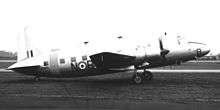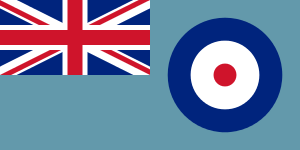No. 110 Squadron RAF
| No. 110 (Hyderabad) Squadron RAF | |
|---|---|
| Active |
1 Nov 1917 – 27 Aug 1919 18 May 1937 – 7 Apr 1946 1 Jun 1946 – 31 Dec 1957 3 June 1959 – 15 Feb 1971 |
| Country |
|
| Branch |
|
| Nickname(s) | Hyderabad, Ipswich's Own Squadron[1] |
| Motto(s) |
Latin: Nec timeo nec sperno ("I neither fear nor despise") |
| Battle honours |
Independent Force & Germany, 1918*; Channel & North Sea, 1939–42*; Norway, 1940*; France & Low Countries, 1940*; Dunkirk; Invasion Ports, 1940; Ruhr, 1940–41; German Ports, 1940–41; Fortress Europe, 1940–42*; Malta, 1941*; Mediterranean, 1941; Arakan, 1943–44*; Burma, 1945*; Manipur, 1944 The honours marked with an asterix* are those emblazoned on the squadron standard |
| Insignia | |
| Squadron Badge heraldry |
Issuant from an astral crown a demi-tiger[2] The demi-tiger was the crest of the Nizam of Hyderabad who presented the squadron with its original DH.9A aircraft in 1918[3] |
| Squadron Codes |
AY (Oct 1938 – Sep 1939) VE (Sep 1939 – Mar 1942) |
No. 110 Squadron RAF was a unit of the British Royal Air Force, initially formed as a bomber squadron during the First World War. Re-formed during the Second World War, again as a bomber squadron, it was re-formed twice more post-war, firstly as a transport, and then a helicopter squadron, before being disbanded in 1971.
History
Formation and World War I

No. 110 Squadron RFC was formed on 1 November 1917, at Rendcomb, Gloucestershire, and was equipped with B.E.2c aircraft. The squadron moved to Kenley the following year and re-equipped with the DH.9A – the first squadron to operate this aircraft. Its original complement of DH.9As were the gift of His Exalted Highness, the Nizam of Hyderabad. Each aircraft bore an inscription to that effect,[4] and the unit became known as the 'Hyderabad' Squadron in the newly formed Royal Air Force. The squadron arrived in France in September 1918 and formed part of the Independent Air Force, engaged in the bombing offensive against Germany, and later disbanded on 27 August 1919.[5]
Reformation and World War II
The squadron reformed on 18 May 1937 at Waddington, equipped first with Hawker Hinds and then Bristol Blenheims. In 1937 No. 88 Squadron was reformed with personnel drawn from 110 Squadron. In 1939, 110 Squadron was posted to Wattisham along with No. 107 Squadron. On 4 September 1939 Nos. 110 and 107 Squadron led the first RAF raid of the war against Wilhelmshaven. The squadron was mainly involved in anti-shipping strikes during the early part of the war, before being posted to India in March 1942. Later that year the squadron converted to the Vultee Vengeance which it operated until November 1944 when it re-equipped with the de Havilland Mosquito. The squadron disbanded at Labuan on 15 April 1946.[6]
Post War on Dakotas and Valettas
The squadron reformed again on 1 June 1946 at RAF Kai Tak via the renumbering of No. 96 Squadron, and was equipped with Douglas Dakotas. In 1948, the squadron took part in Operation Firedog during the Malayan emergency. In October 1951, the squadron converted to the Vickers Valetta which it operated until disbanding on 31 December 1957.[7]
On helicopters
On 3 June 1959, 110 Squadron was reformed at Kuala Lumpur from the merger of No. 155 Squadron and No. 194 Squadron, initially equipped with the Westland Whirlwind HC.4. These were in April 1960 supplemented by the Bristol Sycamore HR.14 with the Whirlwinds being replaced by the much more capable Gnome-engined Whirlwind HAR.10s in July 1963, the Sycamores being finally retired in October 1964. From 1963 the squadron also operated in Brunei and Borneo until November 1967 during the Indonesian Crisis. It then continued its normal duties in Malaya, until the Far East Air Force was run-down. The squadron disbanded on 15 February 1971.[8]



Aircraft operated
| From | To | Aircraft | Variant | Notes |
|---|---|---|---|---|
| Nov 1917 | Jul 1918 | Royal Aircraft Factory B.E.2 | 2d, 2e | |
| Nov 1917 | Jul 1918 | Royal Aircraft Factory R.E.8 | ||
| Nov 1917 | Jul 1918 | Armstrong Whitworth F.K.3 | ||
| Nov 1917 | Jul 1918 | Airco DH.6 | ||
| Nov 1917 | Jul 1918 | Martinsyde G.100 | A6293[8] | |
| Jan 1918 | Jul 1918 | Airco DH.4 | ||
| Feb 1918 | Aug 1918 | Airco DH.9 | ||
| Jul 1918 | Aug 1919 | Airco DH.9A | ||
| Jul 1919 | Aug 1919 | Airco DH.9 | ||
| May 1937 | Jun 1938 | Hawker Hind | ||
| Jan 1938 | Aug 1939 | Bristol Blenheim | Mk.I | |
| Jun 1939 | Mar 1942 | Bristol Blenheim | Mk.IV | |
| Oct 1942 | Dec 1944 | Vultee Vengeance | Mks.I, Ia, II | |
| Nov 1944 | Jan 1945 | Vultee Vengeance | Mks.III, IV | |
| Nov 1944 | Apr 1946 | De Havilland Mosquito | Mk.VI | |
| Jun 1946 | Jul 1947 | Douglas Dakota | C.3, C.4 | |
| Sep 1947 | Apr 1952 | Douglas Dakota | C.4 | |
| Oct 1951 | Dec 1957 | Vickers Valetta | C.1 | |
| Jun 1959 | Jul 1963 | Westland Whirlwind | HC.4 | |
| Apr 1960 | Oct 1964 | Bristol Sycamore | HR.14 | |
| Jul 1963 | Feb 1971 | Westland Whirlwind | HAR.10 |
References
Notes
Bibliography
- Bell, Flight Lieutenant Elwyn D. Hyderabad Squadron: The Story of No. 110 (Hyderabad) Squadron Royal Air Force. Stone Cottage, Great Sampford, Saffron Walden, Essex: Air-Britain (Historians) Ltd., 1971. ISBN 0-85130-014-6.
- Halley, James J. The Squadrons of the Royal Air Force & Commonwealth 1918–1988. Tonbridge, Kent, UK: Air Britain (Historians) Ltd., 1988. ISBN 0-85130-164-9.
- Jefford, C.G. RAF Squadrons, a Comprehensive record of the Movement and Equipment of all RAF Squadrons and their Antecedents since 1912. Shropshire, UK: Airlife Publishing, 1988 (second edition 2001). ISBN 1-85310-053-6.
- Moyes, Philip J.R. Bomber Squadrons of the RAF and their Aircraft. London: Macdonald and Jane's (Publishers) Ltd., 2nd edition 1976. ISBN 0-354-01027-1.
- Rawlings, John D.R. Coastal, Support and Special Squadrons of the RAF and their Aircraft. London: Jane's Publishing Company Ltd., 1982. ISBN 0-7106-0187-5.
External links
| Wikimedia Commons has media related to No. 110 Squadron RAF. |
- History of No.'s 106–110 Squadrons at RAF Web
- Aircraft and markings of No. 110 squadron on Raf Web
- 110 Squadron history on official RAF website
